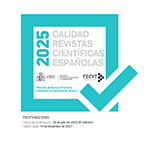The accessibility of online television in Spain: analysis of the programming of Antena 3 and Telecinco
Abstract
Access to information is a fundamental right that is particularly relevant in the case of television because of its origin as a public service and its role of social inclusion. Therefore, European and Spanish legislation provides that television content must include subtitles, audio description and sign language to be accessible. This argument also extends to online television in a society in which the Internet penetrates in all areas of life by changing the habits of communicative consumption. This article analyzes the accessibility of the online content, live and on demand, of the two most watched television channels in Spain -Antena 3 and Telecinco- and demonstrates the hypothesis that the levels of accessibility of online content are non-existent or very inferior to those of traditional television, preventing the access of people with a visual or hearing disability.Downloads
Article download
License
In order to support the global exchange of knowledge, the journal Estudios sobre el Mensaje Periodístico is allowing unrestricted access to its content as from its publication in this electronic edition, and as such it is an open-access journal. The originals published in this journal are the property of the Complutense University of Madrid and any reproduction thereof in full or in part must cite the source. All content is distributed under a Creative Commons Attribution 4.0 use and distribution licence (CC BY 4.0). This circumstance must be expressly stated in these terms where necessary. You can view the summary and the complete legal text of the licence.










